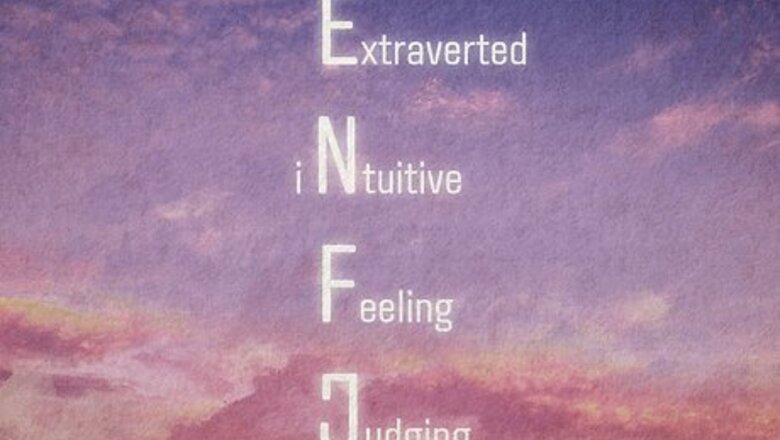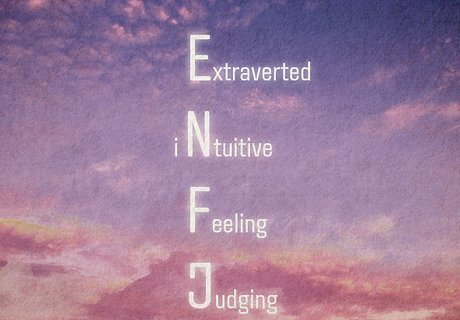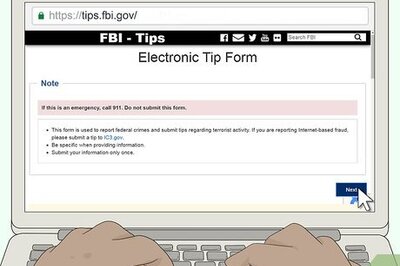
views
- ENFJ stands for extraverted, intuitive, feeling, and judging.
- ENFJs, also known as “Protagonists,” are natural-born leaders with a charismatic attitude and strong moral compass.
- ENFJs tend to put other people’s needs above their own, sacrificing their own needs for the greater good.
ENFJ Cognitive Functions

ENFJ stands for extroverted, intuitive, feeling, judging. Each Myers-Briggs personality type is organized by cognitive functions. These functions determine how someone interacts with the world and makes decisions. An ENFJ’s cognitive functions are as follows: Dominant: Extraverted Feeling ENFJs gain energy by being social with others and make decisions based on how others feel (often ignoring their own needs). Auxiliary: Introverted Intuition ENFJs think about the future and focus on long-term rather than short-term goals. Because of this, they often lose sight of specific in-the-moment details. Tertiary: Extraverted Sensing ENFJs rely on their senses to take in the present moment. This often leads them to seek out immersive experiences or activities. Inferior: Introvert Thinking ENFJs enjoy planning. They like things to be organized and feel most in control when there’s a detailed schedule.
What is an ENFJ personality type?

ENFJs are extroverted, positive, and supportive individuals. Also known as “the Protagonist” or “the Giver,” this personality type is a natural-born leader. ENFJs aren’t afraid to speak up for what’s right and take action. They care deeply about others and are effective communicators. In other words, they’re devoted altruists. ENFJs make up about 3% of the population, being one of the rarest Myers-Briggs personality types. ENFJ is an acronym for Extroverted, Intuitive, Feeling, and Judging. Perhaps you know these famous ENFJs: Oprah Winfrey, Martin Luther King Jr., Barack Obama, Maya Angelou, and Jennifer Lawrence. ENFJs thrive in leadership roles where they’re able to communicate and interact with others, making them excellent teachers, psychologists, coaches, social workers, and managers.
ENFJ Strengths

Receptive It’s easy for an ENFJ to find common ground. Although they have strong opinions, they’re rarely close-minded. They love learning new perspectives and can recognize that everyone has their own truth and story to tell. If you’re an ENFJ, use your receptive nature to have healthy debates and solve social conflicts. Take on the role of mediator to keep your friends or coworkers in line.

Passionate When an ENFJ has their mind set on something, they’ll do everything possible to make it happen. They enjoy creative hobbies and take pleasure in learning new things. Because of this, ENFJs are constantly on the go and are rarely ever bored—how could they be with so many passion projects? If you’re an ENFJ, try to focus on one hobby at a time. We know you have a lot of interests and passions, but going head first into them all at once could be overwhelming.

Charismatic ENFJs are some of the most affectionate and caring people you’ll ever meet. Their altruistic, empathetic, and friendly nature helps them put themselves in anyone’s shoes. They’re always willing to lend a helping hand, even if it means putting themselves out. If you’re an ENFJ, use your caring characteristics to meet new people and learn new things. Spark up a conversation with the barista or grocery clerk.

Reliable The worst thing an ENFJ could do is let someone down. They hold themselves to high standards and take pride in being counted on. ENFJs keep their promises and won’t hesitate to take on extra responsibilities. If you’re an ENFJ, make sure not to spread yourself too thin. It’s okay to say “yes” to things, but keep time in your schedule to work on your own interests and hobbies.
ENFJ Weaknesses

Self-sacrificing ENFJs often put other people’s needs before their own. Their empathetic and altruistic nature can get the best of them, and they can easily forget to care for themselves. If you’re an ENFJ, make time in your busy schedule to rest and recuperate. Plan a spa day, watch a movie, or do a yoga flow. Remember, you can’t fill someone else’s cup without filling your own.

Overly idealistic ENFJs believe everyone should be perfect. The Protagonist personality type has a strong moral compass and can see right from wrong. While this isn’t necessarily a bad thing, it can create tension. If someone doesn’t follow the rules, an ENFJ can be easily hurt. If you’re an ENFJ, keep in mind that nothing is truly perfect. It’s okay to make mistakes and watch others make mistakes. Remember, you won’t be able to learn without screwing up a little and accepting faults.

Indecisive Protagonists may find themselves in the middle of disagreements or conflicts. They’re people pleasers at their core, which can be their downfall. They can have a hard time making choices (even with their strong moral compass) because they want everyone to be happy. If you’re an ENFJ, try to focus on your own wants and needs every once in a while. This isn’t selfish; it’s self-care. It’s perfectly okay to make choices that only benefit you.

Overly empathetic ENFJs tend to make other people’s problems their own. While their compassionate nature is a strength, it can also be their greatest weakness. Taking on too many outwardly problems can leave them physically and mentally exhausted and put their relationships in jeopardy. If you’re an ENFJ, ask others if they need help before giving it. This way, you respect their privacy and space without extending yourself right off the bat.
ENFJ Relationships

ENFJs are quick to fall in love. Dating an ENFJ can be an intense experience. They tend to jump into relationships head first, wearing their heart on their sleeve. An ENFJ puts their all into a relationship and aren’t afraid to make the first move. ENFJs are the most compatible with those who value emotional connection and generosity as much as they do, such as ENFPs and INTPs. If you’re an ENFJ, remember to take a step back from your partner’s life occasionally. Being too involved could make you come across as a bit overbearing. If you’re dating an ENFJ, don’t hesitate to tell your partner how much you appreciate their caring nature. They put a lot of effort into the relationship, so offer the same support and kindness in return.

Making friends comes easily to an ENFJ. ENFJs are constantly connecting with people wherever they go. Their extroverted, charismatic, and empathetic nature gives them a leg up when forming friendships. They value meeting people from all walks of life and cherish each and every friend they make. If you’re an ENFJ, sign up for clubs and community events to meet new people in your neighborhood. The more activities and hobbies you participate in, the more people you’ll meet! If you’re the friend of an ENFJ, don’t be afraid to accept help from them. Offering support is their way of showing love, so think twice before you turn them down.

As parents, ENFJs take a hands-on approach. They enjoy helping their children navigate the world, introducing them to new things, activities, and people. Even so, ENFJs may be overprotective of their kids because of their strong moral values. They tend to hold their children to high standards and can become disappointed when they fail. If you’re an ENFJ parent, know that it’s perfectly normal for children to make mistakes—it’s how they learn and grow! Remember, perfection doesn’t necessarily equal happiness.
ENFJ Career Paths

ENFJs thrive in practically any work environment. These individuals are extremely adaptable and flexible thanks to their extroverted and receptive natures. Above all else, they enjoy teamwork and can quickly turn solo assignments into group collaborations. They value strong moral values and benefit from working in a company they can fully support and help grow. If you’re an ENFJ, look for work that allows you to support others and grow as a colleague and individual. Your passion and drive can help you change and elevate any workplace. If you’re hiring an ENFJ, assign them to leadership roles to get the most out of them and cultivate a workplace community.

ENFJs do well in executive and leadership positions. Because of their extroverted and charismatic natures, ENFJs make great teachers, managers, coaches, psychologists, and social workers. They’re able to use their empathy to communicate and connect with people on an emotional level, helping them guide others down the right path.


















Comments
0 comment